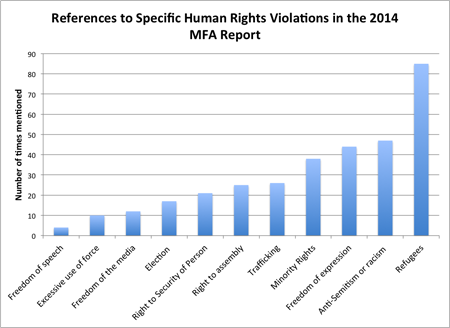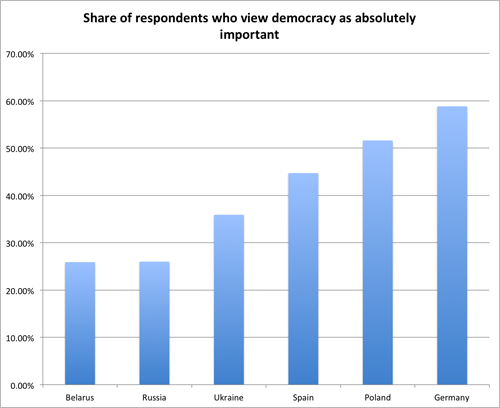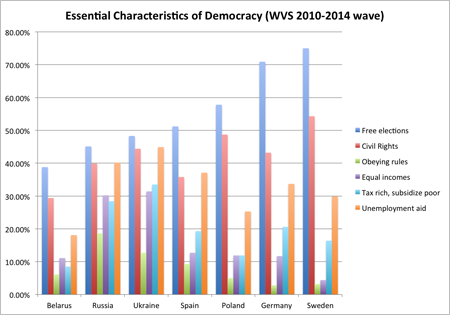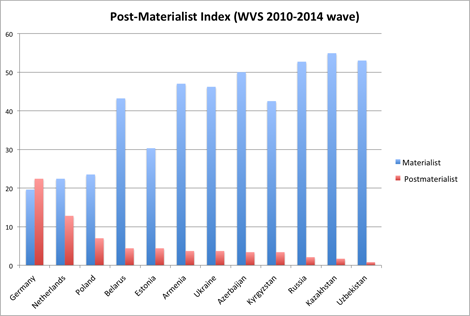Belarus Uncovers Human Rights Abuses in the West

Jude Law Protests Human Rights Violations in Belarus in 2011
On 27 February, the Belarusian Foreign Ministry (MFA) released a report provocatively titled “The Most Resonant Human Rights Violations in Certain Countries.”
The report criticises human rights violations in 25 democracies, ranging from ethnic discrimination to miscounting votes. It includes a section on the United States, which routinely excoriates Belarus in its own human rights reports.
No, Belarus did not suddenly become concerned about human rights. Minsk wants to drive home the point that democracies also violate rights, and in so doing, counter the criticism of its own deplorable record by the United States, Human Rights Watch, Amnesty International, and other organisations.
Even though the incidents it mentions are true, the report will not have the desired effect until the human rights situation in Belarus improves. If anything, the report serves to highlight Belarus’s own deplorable rights record.
Preaching Non-Interference and Acceptance of Different Developmental Paths
The report focuses on democracies, several of which imposed sanctions on Belarus for human rights violations in the past. In Eastern Europe, the report targets only the states that joined the European Union (EU). It omits post-Soviet countries and Belarus itself.
This is the third such report disseminated by Minsk. Igar Gubarevich, a senior analyst at the Ostrogorski Centre who held senior positions at the Belarusian Foreign Ministry, notes that "Belarus delayed the report's publication significantly" this year in order not to interfere with the normalisation of relations with the EU and the United States that has gathered momentum in the wake of the Ukraine Crisis.
the state and society are in “perpetual” conflict in all states, regardless of their "political system[s]" Read more
The West is also stirring up less controversy around the report. In the past, several states mentioned in the report denounced Belarusian criticism as hypocritical. This time around, the majority of countries on Belarus’s “list of shame” did not bother to respond.
According to the report, the state and society are in “perpetual” conflict in all states, regardless of their "political system[s]" or "the level of social and economic development." It calls for appreciating “the diversity of development paths.” Wittingly or not, these and other sections of the report read as attempts to normalise human rights violations.
The report also reminds readers of the principle of non-interference in domestic affairs, the "golden rule" of Westphalian thinking that Minsk routinely mentions when communicating with the Kremlin and the West alike.
Why does Belarus suddenly care about the state of human rights? The MFA does not hide its primary motivation: to highlight "violations in those countries that traditionally represent themselves as ‘developed democracies’" and "to illustrate by concrete facts their failure to comply with international legal obligations.”
Seeing the Mote in our Neighbour's Eye
The report draws on the Human Rights Council Universal Periodic Review and other open sources.
It faults the United States for racial discrimination and excessive use of force by the police, drawing attention to last year's events in Ferguson, Missouri. The report also mentions the failure to close the Guantanamo Bay prison facility and to prosecute persons involved in torture, as well as the deportation and detention of migrants.
In the section on Poland, the report notes the discovery of a secret CIA prison. MFA faults Warsaw for anti-Semitism and racial discrimination, as well as the excessive use of force by the Polish police. The report also mentions the “inadvertence in counting the votes” during the 2014 European Parliament election. Belarus’s neighbour Lithuania is criticised for the pressure on the Russian-language media.
The report notes that the Netherlands leads Europe in the dissemination of child pornography and has a major human trafficking problem. Human trafficking is a sore point for Belarus; despite its attempts to curb trafficking, it remains on the Tier 2 Watch List of the US Trafficking in Persons Report.
MFA also draws attention to the rise in neo-nazism and racial discrimination vis-à-vis refugees in Austria and to the excessive use of force by law enforcement agencies in Belgium.
The report contains a high number of references to the rights of refugees. Refugees are indeed a growing problem for Western Europe. It also happens to be an area in which Belarus believes its own record is solid. President Lukashenka has been especially welcoming of late to Ukrainian refugees.
Practise What You Preach: Why Belarus's Report Does Not Matter
Perhaps the MFA wanted to get across that human rights violations occur everywhere and that state identity or coercive power should not blind us to human rights violations. This message gets lost on the reader, however, because Belarus itself is excluded from the report. For comparison, the US Trafficking in Persons Report has a section in which it examines the problem of trafficking in the US as well as all US-allied countries.
Unlike Belarus democratic states have the independent media and NGOs to publicise offences, as well as independent courts to punish transgressors Read more
MFA acknowledges that it did not attempt “a complete picture of the situation of human rights in the countries in question” but simply focused on “the most egregious human rights violations.” Such selective focus undermines the MFA’s potentially valid point, however.
Democracies mentioned in the report hardly needed the MFA to remind them about domestic violations of human rights. The key difference between democratic states and Belarus is that the former have the independent media and non-governmental organisations (NGOs) to publicise offences, as well as independent courts to punish transgressors. Neither civil society nor the judicial system functions particularly well in Belarus. Ironically, the many European NGOs whose information the MFA draws upon in the report would not be able to do their work in Belarus.
Political scientists Judith Kelley and Beth Simmons show that international rights reports and other performance indicators can indeed serve as a powerful international tool of social pressure. Using the example of US human trafficking reports, they demonstrate that negative evaluations and rankings can motivate states to implement costly policies.
But social pressure works only when exerted by nonstate actors and international organisations on “highly respected or hegemonic state actors.” Not only is Belarus a small, economically and militarily weak state, but it also lacks international credibility on most issues, above all human rights. Human rights reports carry no power when disseminated by the state that refuses to cooperate with the UN Special Rapporteur on human rights, suppresses civil society and independent media, and keeps political prisoners.
Until Belarus respects human rights domestically, its criticism of violations abroad will mean as much as a corruption index produced by Somalia or North Korea, two of the world's most corrupt countries.
"The report stands little chance of being taken seriously or even getting noticed by the international community," said Gubarevich. "This collection of isolated incidents – all of them freely reported by national media in the countries concerned – pales in comparison to systematic human rights violations in Belarus that the government-controlled media fails to mention."
Indeed, according to Human Rights Watch, an international NGO conducting research on human rights since 1978, Belarus’ human rights record remained poor in 2014. According to the United Nations Special Rapporteur on human rights, Belarus helped "ease the tensions and human rights crisis" in neighboring Ukraine, yet failed to address the violation of human rights at home. Domestic rights NGO "Viasna" would agree with these international assessments, especially because its registration was cancelled in 2003 and its rights defenders are routinely detained in Belarus.







